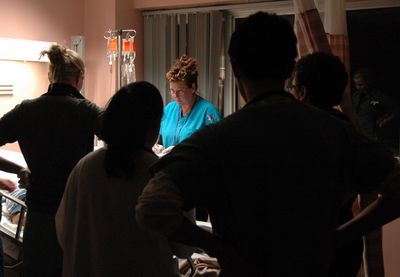



Who are the members of the health care team?

A team can be defined as:
A collection of individuals who are interdependent in their tasks, who share responsibility for outcomes, who see themselves and who are see by others as an intact social entity embedded in one or more larger social systems and who manage their relationships across organizational borders. [1]
In health care, the most common types of teams are:
project teams (e.g. quality improvement teams)
care delivery teams by patient population (e.g. geriatric teams), disease type (e.g. stroke team), patient care setting (e.g. long term care)
The Oncology Team

The care of patients with cancer is an example of multidisciplinary and interprofessional teams. The cancer clinic and the inpatient unit on Connell 10 have teams of professionals devoted to the care of patients with cancer.
The following link will take you to an animation where you will hear from various professionals about their contribution to the cancer care team.
The video clips show how members of the cancer care team bring together a breadth of expertise and experience to assist the patient.
The team approach can be likened to a relay where the baton is passed to the professional that is best capable to deal with the active issue. (At times, it can feel like a hot potato as well, especially when no one wants to take on responsibility like Friday afternoons!).
Finding the right health care professional
We can’t work together unless we understand the scopes of practice of all members of the team.

Teams
are not always immediately functional
require effort and commitment of the members
are not all the same, what works for one team may not work for another
need to be safe and have ways of discussing difficult topics
Team Development
In 1965 Bruce Tuckman published a paper proposing a predictable set of stages through which a team will pass while developing
1. Forming - the coming together of a group
2. Storming - the articulation and sorting of various needs, wishes and goals
3. Norming - coming to a an agreed way of being/working together
4. Performing - working together as a well functioning team
5. Adjourning/mourning - not about the function of the team, but an acknowledgment that the experience of being in a team affects us
Much has been written on this, but it is important to know that teams are organic, they grow and change and develop over time.
Roles in groups
Just like there are many leadership styles there are also many roles that people play in teams. The role you play will change over time and in different situations. As a resident, your knowledge and expertise will also change over time which will add to the variety of roles you may play. Changing roles can be stressful at times and it is important to recognize when you feel overwhelmed or inexperienced. Understanding the various roles at play in group situations may help one’s acceptance of others.



Team leader versus Team member
In a healthy collaborative environment, it is likely that leadership is fluid and dynamic, that all members of the team will have an opportunity to provide leadership. Depending on the circumstances, one team member may need or be expected to take on a more prominent role. For example, in a situation when a patient requires nursing home placement, it is often more appropriate for the social worker to take on more of a leadership role. It is not unusual for physicians to be looked to as leaders and we are trained to fill this role. Other factors such as gender, cultural norms, power structure/imbalance and history all contribute to this. These issues are complex and can effect a teams function.
When physicians are taking the role of leader it is good to think about how this came to be - Was it discussed? Will leadership rotate? Are we as involved when someone else is taking the lead?
The history of a physician being at the top of the health care professional hierarchy can influence the attitudes of the other members of a health care team. One should be aware that there may be difficulties in the team because of resentment stemming from the historical dominance of a physician in the health care setting. Often, these resentments manifest towards students and residents in medicine rather than towards attending physicians.
_________________________________
 Previous
Previous